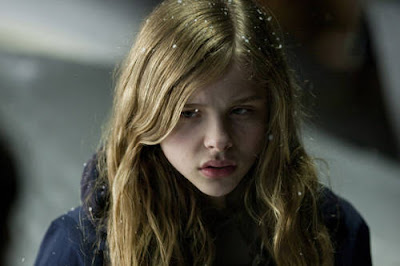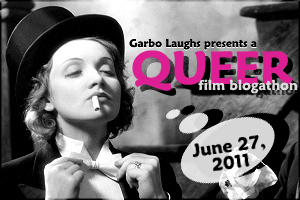When it was announced that there was a remake in the works for the 2008 Swedish vampire movie, Let the Right One In, I was dubious, to say the least. Oh, I wasn't surprised--Hollywood is voracious for properties it doesn't have to spend money on developing, after all--but it was disappointing. I'm not constitutionally opposed to remakes. Some of my favorite films in the world are remakes of one variety or another. But this remake in particular seemed pointless. Why remake a movie of such recent vintage and of such a formidable reputation. The filmmakers were setting themselves up for heartbreak. It's a no win situation, really, because no matter how good the movie is, it will always be compared to the original.
Or so I thought when I first heard about it. In the interim, it occurred to me that this scenario has played out before, in 1964, when some Italians remade Akira Kurosawa's Yojimbo. They turned it into a western, actually, and named it A Fistful of Dollars. I think you can see the source of my chagrin.
In any event, the remake exists, retitled Let Me In (2010), and the poor bastard who has been set up for a fall is director Matt Reeves. He doesn't deserve what he will surely get, because he has approached the material with as much respect as anyone could want and produced a movie that, on its own terms, is really good. Mind you, it's largely the same film as the Swedish film, but it hasn't screwed up anything in translation. It shares the original's virtues, and minimizes some of that film's flaws (while introducing flaws of its own). Almost everything I wrote about the original film applies to this one.

I was surprised, however, that the remake amplifies the queerness of the story, given that I had heard (correctly) that it omits some uncomfortable facts about its child vampire's anatomy. The alienation of our young protagonists, renamed Owen and Abby, seems even more genderqueer. Kodi Smit-McPhee's Owen seems even more fey and androgynous than Oscar was, and Abby, like Eli, still insists that she's "not a girl," and still asks if Owen would still like her if she wasn't a girl. The bullying Owen endures is more overtly homophobic, too. The timing of the movie's release is uncanny, actually, given the rash of bullying-related suicides of GLBT kids in the news in the weeks prior to its release.

What's new in this movie? A few things. First and foremost, you get the two lead performances from Kodi Smit-McPhee and Chloë Moretz. I don't know if child actors are just getting better, or if the ability of directors to direct child actors is getting better, but these two are astonishing. You also get a subtle, infinitely sad performance from Richard Jenkins as the familiar. Jenkins figures into the film's most bravura addition to the original: a car crash scene that takes its cues from the bank heist in Joseph Lewis's Gun Crazy. I do NOT know how they got that footage, but it's amazing. Also, Michael Giacchino's score is lovely and mournful. Reeves streamlines some of the narrative, too, omitting some of the adults, though not the important scenes, and adds a policeman character and an element of police procedural. These are not necessarily harmful additions. The addition of CGI mayhem, on the other hand, IS intrusive. It shocks the audience out of the narrative, which is never a good thing. Still, the original had that scene with the CGI cats, which this film mercifully omits. One ill-considered element in the remake is that Abby seems a bit more of a monster, and seems to be manipulating Owen more overtly. The inclusion of some of the history of her familiar robs the film of some of the ambiguity of the original. This is probably the element that will forever keep this film in the original's shadow.

This film also adds a couple of social themes to the background. The dawning of Reagan-era conservatism is overtly referenced, all while the movie shows the incipient decline of the quality of life for poor America. There's a new religious undercurrent, too, which goes hand in hand with this theme, and which adds to the "alienation of queer youth" element of the film. For the most part, these additions are unsubtle, unlike the first film's almost subliminal critique of the Swedish social welfare state.
This film is the flagship of the relaunch of Hammer Films. It's a vampire movie, which have traditionally been the stock in trade at Hammer, so they arguably have some proprietary interest in it. This may very well be the best film ever released under the studio's imprint. I wish them luck with it. They're going to need it.

Current Challenge tally:
Total Viewings: 3
First Time Viewings: 3

















2 comments:
Wow. I'm glad to hear that it's not a total train wreck. Seems like this could be this year's QUARANTINE, where they decide to basically recreate the original for an English audience. Obviously, this begs the question if it really needed to be remade, but that's a discussion for another day.
Bottom line, thanks for the review, and thanks for reassuring the faithful.
I would argue that Quarantine screwed up the translation. I watched both [•REC] and Quarantine in close proximity last year, and there's definitely some animating impulse in the original that the American version completely missed. Let Me In, on the other hand, seems to "get" it, for the most part.
Post a Comment